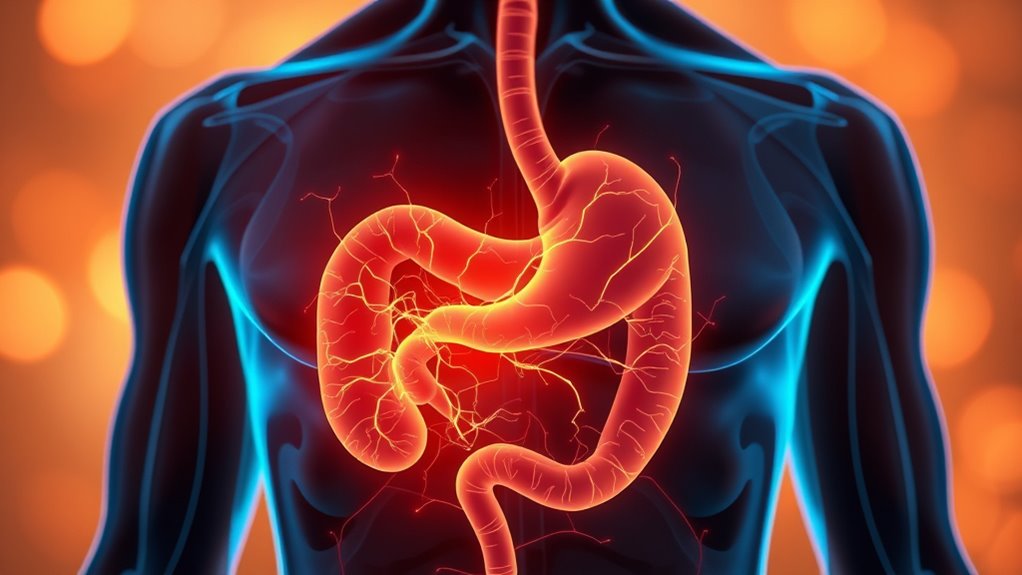I’ve learned that your gut microbiome plays a big role in shaping your mood because it produces and regulates key neurotransmitters like serotonin, dopamine, and GABA, which directly influence how you feel. An imbalance in your gut bacteria can lead to inflammation and mood disorders such as anxiety and depression. Focusing on your gut health with a balanced diet, probiotics, and stress management can boost your emotional resilience. Keep exploring to uncover more about this fascinating connection.
Key Takeaways
- The gut–brain axis connects digestive health and mental well-being through a communication network involving the microbiome.
- A diverse gut microbiome produces neurochemicals like serotonin and GABA that influence mood and emotional stability.
- Approximately 90% of the body’s serotonin is produced in the gut, linking digestion directly to happiness and mood regulation.
- Imbalances in gut microbiome diversity can disrupt neurotransmitter synthesis, leading to symptoms like anxiety and depression.
- Lifestyle choices such as diet, exercise, and stress management support healthy gut microbiome, positively impacting mood and mental health.

The gut–brain axis is a complex communication network that links our digestive system with our central nervous system. It’s fascinating to realize how the health of our gut can influence our mood, thoughts, and overall mental well-being. At the core of this connection is the microbiome—the trillions of microorganisms residing in our gut. The diversity of this microbiome, known as microbiome diversity, plays a essential role in maintaining a balanced mood. When this diversity is high, it means there’s a variety of beneficial bacteria working together, supporting not just digestion but also producing necessary neurochemicals that influence our brain function.
One of the most significant ways the microbiome impacts our mood is through neurotransmitter production. These are chemical messengers that transmit signals within our nervous system. Surprisingly, about 90% of the body’s serotonin, a neurotransmitter often associated with happiness and well-being, is produced in the gut. This production is heavily influenced by the types of bacteria present. Certain strains of gut bacteria can synthesize neurotransmitters like gamma-aminobutyric acid (GABA), dopamine, and serotonin, which directly affect our mood, stress levels, and anxiety. When the microbiome is balanced and diverse, it can support ideal neurotransmitter production, promoting feelings of calm and stability.
Most of the body’s serotonin is produced in the gut, influenced by diverse beneficial bacteria supporting mood and calmness.
Conversely, if the microbiome becomes less diverse—due to poor diet, stress, antibiotics, or illness—this can disrupt neurotransmitter synthesis. A less diverse microbiome is often associated with increased inflammation and a dysregulated gut environment, which can send negative signals through the gut–brain axis. This imbalance can lead to symptoms such as depression, anxiety, and cognitive fog. It’s like the communication network gets muddled, and the messages that regulate our mood are compromised.
What’s truly empowering is knowing that we can influence our microbiome diversity through lifestyle choices. Eating a varied diet rich in fiber, fermented foods, and probiotics helps nurture a thriving, diverse microbiome. Regular exercise, managing stress, and avoiding unnecessary antibiotics also support this ecosystem. When we take steps to enhance our gut health, we’re not just improving digestion—we’re actively supporting our brain’s chemistry and emotional resilience. It’s a reminder that our gut and mind are more connected than we might have thought, and caring for one benefits the other in profound ways.
Frequently Asked Questions
Can Gut Bacteria Be Changed Through Diet Alone?
Yes, gut bacteria can be changed through diet alone. I’ve seen firsthand how diet modification can boost microbial diversity, which is essential for a healthy gut. Eating fiber-rich foods, fermented products, and reducing processed foods support beneficial bacteria growth. By consistently making these dietary changes, you can positively influence your gut microbiome and, in turn, improve your overall mood and digestion.
How Quickly Can Mood Improve After Gut Health Changes?
Think of your gut as a garden—tend it well, and you’ll see blooms in your mood pretty quickly. Usually, mental health timing shows mood improvements within a few days to a couple of weeks after gut health changes. Factors like diet, stress levels, and sleep influence how fast you notice these shifts. Stay consistent, and you’ll likely feel brighter, as your gut’s harmony begins to sing in tune with your mind.
Do Probiotics Directly Affect Mental Health?
Yes, probiotics can directly affect mental health, especially through psychobiotics research that explores how certain strains influence mood and anxiety. I’ve seen that they improve gut microbiota diversity, which is linked to better mental well-being. While results vary, many find that taking specific probiotics supports mood stability by positively impacting the gut-brain axis. It’s a promising area, but I recommend consulting a healthcare professional for personalized advice.
Are There Specific Foods to Boost Gut-Brain Communication?
Yes, certain foods can boost gut-brain communication. I recommend incorporating fermented foods like yogurt, kefir, sauerkraut, and kimchi into your diet, as they provide beneficial probiotics that support a healthy microbiome. Additionally, eating plenty of dietary fibers from fruits, vegetables, and whole grains helps feed good gut bacteria, promoting better digestion and mood regulation. These foods work together to strengthen your gut-brain connection naturally.
How Does Stress Impact Gut Microbiota Composition?
When I experience stress, it can cause stress-induced dysbiosis, disrupting my gut microbiota’s balance. This imbalance weakens microbiota resilience, making it harder for my gut to recover and maintain healthy communication with my brain. I’ve noticed that managing stress helps preserve my microbiota’s stability, supporting better mood and digestion. Prioritizing relaxation and stress-reduction techniques can really make a difference in maintaining a healthy gut-brain connection.
Conclusion
So, here I am, telling you that your gut might just be running the show, while your brain’s busy thinking it’s in charge. Turns out, digestion isn’t just about food—it’s about mood, stress, and even happiness. Who knew that tuning into your gut could be the secret to feeling better? Irony’s got a funny way of sneaking up on us—sometimes, the key to peace of mind is in the tummy all along.









